The proposed planning procedural changes would mean only those "directly and adversely impacted" could appeal a decision. (Supplied: Rob Blakers)
In short:
The Tasmanian government has proposed limiting third-party planning appeals, so only parties directly affected by a planning decision from appealing it. The move could prevent external groups, such as NGOs and activist organisations from appealing planning decisions made on public land.
The proposed change has been criticised as unnecessary and "undemocratic" by critics including environmental groups, the Greens and Labor.
What's next?
The government says it's still consulting on the change, and it was too early to say whether third-party appeals of proposals on public land would still be allowed.
The Tasmanian government has announced plans to limit who can lodge an appeal to the state's appeals tribunal, so only parties deemed as "aggrieved by a planning decision" can do so.
But critics have said the proposal to prevent third parties from lodging planning appeals is an "anti-democratic" move.
Planning Minister Felix Ellis said cracking down on third-party appeals to the Tasmanian Civil and Administrative Tribunal would "prevent baseless objections that tie projects up in delays and red tape".
"This legislation will mean that appeals can only be lodged by someone who is directly and adversely impacted by the planning decision, not well-funded activist groups and anti-everything organisations set up to oppose Tasmania moving forward," he said.

A government briefing note from 2018-19 stated only about 10 appeals were not resolved following mediation. (ABC News: Luke Bowden)
The change has been roundly criticised by environmental groups, including the Bob Brown Foundation, which lodged a third-party appeal against the Robbins Island wind farm.
Bob Brown Foundation campaigner Scott Jordan said the move was another step in "a long line of anti-democratic measures by this government".
"Removing third-party appeal rights from our planning processes removes the capacity for decisions that have been made on substandard information to be properly analysed by an appeals body," he said.
"It's particularly egregious where we're talking about areas of public land.
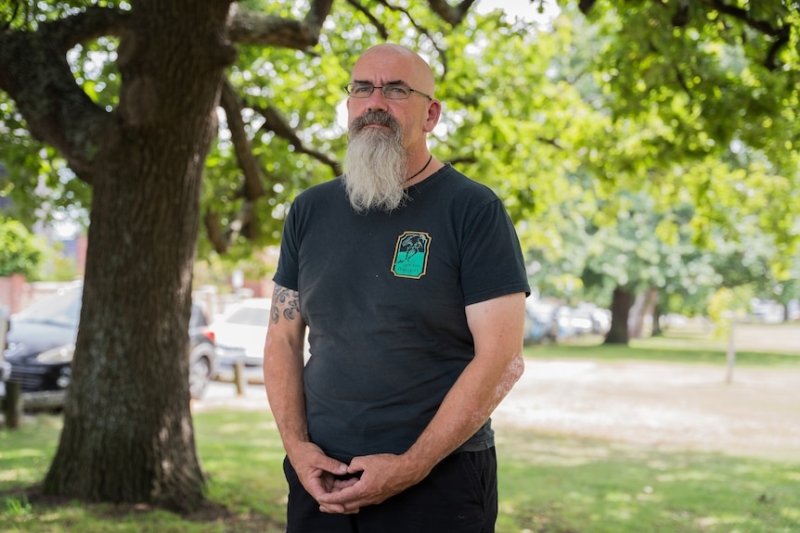
Scott Jordan called the move "anti-democratic". (ABC News: Ashleigh Barraclough)
Tasmanian government loses bid for planning changes
Photo shows An aerial view of a city during sunset.
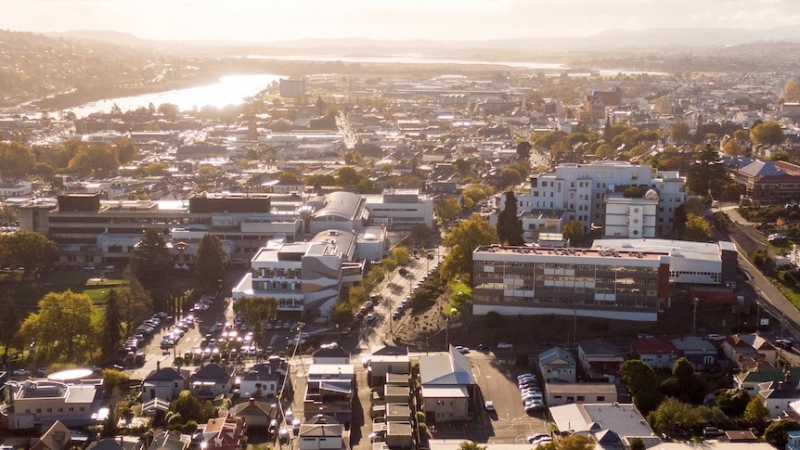
"In the case of mining applications or developments in national parks or any of those situations, they won't have neighbours that have an appeal right, so by removing third-party appeal rights you remove the ability for the general public to get involved in questions that involve public assets."
Premier Jeremy Rockliff did not commit to whether third-party appeals would still be allowed for proposals on public land, such as on Kunanyi/Mt Wellington, saying it would be determined after public consultation.
"We're open to all suggestions. We just want investment in Tasmania and fairness and opportunity when it comes to sensible developments and not frivolous appeals," Mr Rockliff said.
Proposal scraped in 2018-19
Environmental groups, the Greens and Labor have all criticised the policy, claiming it unnecessary.
Energy projects in Tasmania to be fast tracked under law changes
Photo shows Wind turbines over farmland.
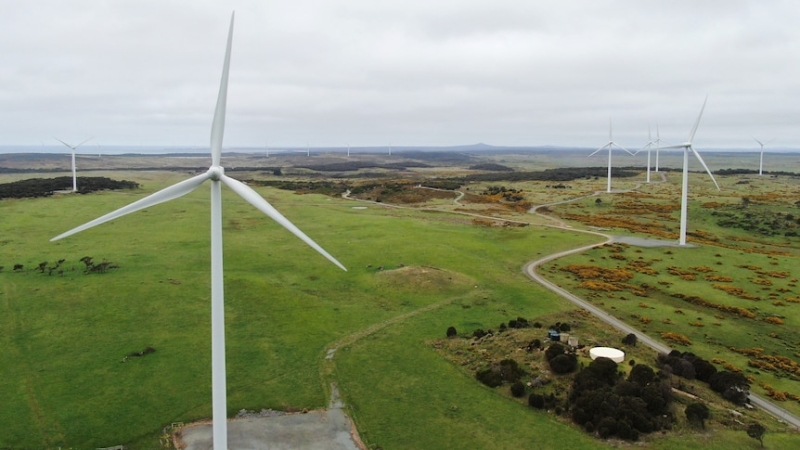
Information obtained under right-to-information laws shows the government abandoned its policy to abolish third-party appeals after it was "considered in detail during 2018–19", a briefing note prepared for Housing Minister Roger Jaensch in September last year said.
"At the time, the proportion of appeals did not warrant any change to the requirements for third-party appeals," it read.
The briefing note said only 1 per cent of development applications were appealed in 2018–19, with no data collected about how many of those were third-party appeals.
It stated only about 10 appeals were not resolved following mediation, meaning the "scale of the problem created by third-party appeal at that time was not evident by the data."
The briefing note to Mr Jaensch stated the current data was similar to five years ago, "with only around 1 per cent of applications being appealed and with a significant proportion resolved through mediation".
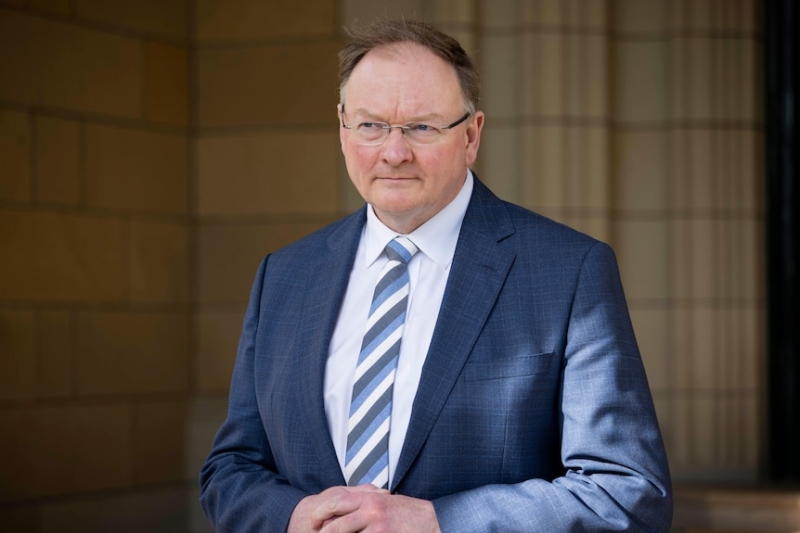
A briefing note prepared for Housing Minister Roger Jaensch in September last year said the proposal was "considered in detail during 2018–19". (ABC New: Maren Preuss)
Labor MP Shane Broad said the idea was a "patch job" designed to "cover up for a decade of neglect" of the planning system.
"Minister Ellis's thought bubble is a carbon copy of the Liberals' policy from 11 years ago that they didn't implement after receiving advice from the Department of Premier and Cabinet," he said.
"It's been close to 10 years since the Liberals promised to make planning fairer, faster, cheaper, and simpler with a singular statewide scheme, but as usual they've been all talk and no action, with the system becoming more complicated, inefficient, and out of touch with the needs of Tasmanians."
Tasmanian Conservation Trust chief executive Peter McGlone said abolishing third-party appeals was "an atrocious decision".
"The government's own advice is there's no problem with planning appeals, in fact the very low level of developments that are appealed are resolved in mediation. There's no problem for the minister to step into," he said.
Mr McGlone said he was concerned no one would have a right to appeal a future cable car proposal for Kunanyi/Mt Wellington, or a large hotel development in areas of the Hobart CBD where there were few close neighbours.
"The way they've framed it, a person who lives right next door and is directly impacted might be individually able to take an appeal but that person may be a lone individual with no resources, rather than an organisation or a community broadly," he said.
Change comes after meetings with golf course developer
The right to information documents show the change comes fewer than six months after Mary Massina, the former chief executive of Mary Ann's Island — which is proposing to build the Arm End golf course — arranged to meet with Mr Jaensch.
A briefing note ahead of the meeting said Ms Massina was "seeking to discuss how the government has delivered on its 2014 election commitments in relation to planning reform with a specific interest in the government's 2014 election plan to reduce third-party planning appeals".
The note initially stated the meeting was scheduled with both Mr Jaensch and the Premier.
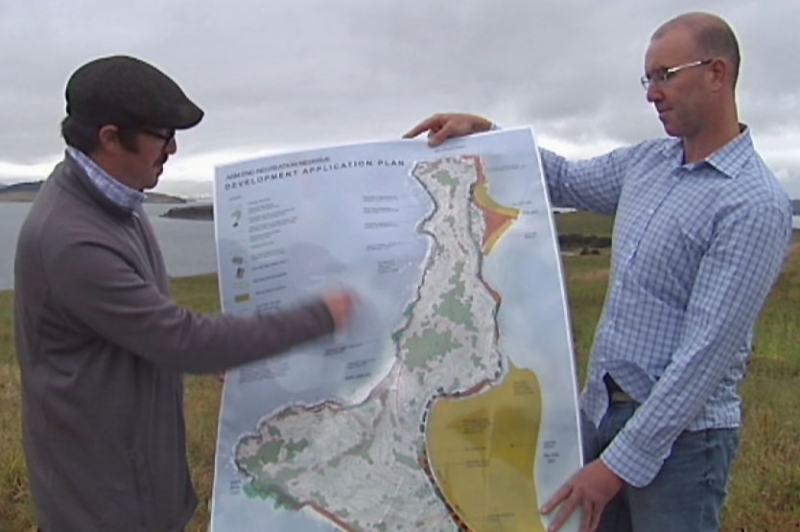
The Arm End golf course was first proposed in 2010, and has been opposed by some community groups. (ABC News)
But asked about Ms Massina's involvement on Friday, Mr Rockliff said he had not "spoken to individuals such as the person that you mentioned".
Greens MP Helen Burnet said the timing of the announcement, made on a podcast hosted by Ms Massina's husband Becher Townsend, raised questions.
"There are so many questions about what the government is trying to deliver for developer mates," she said.

